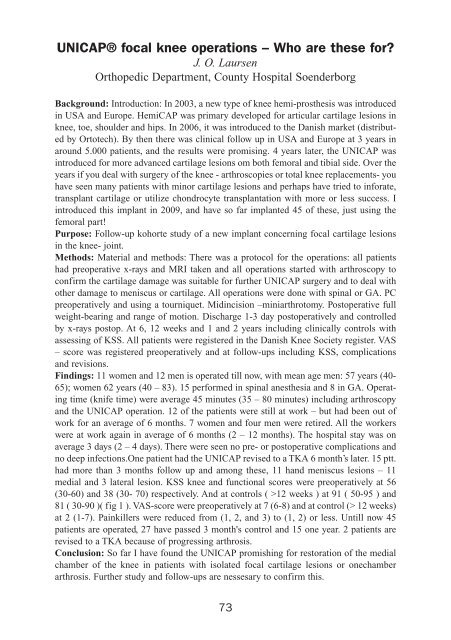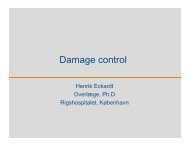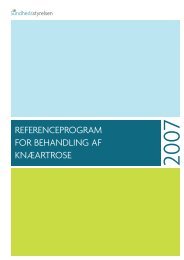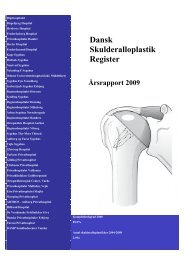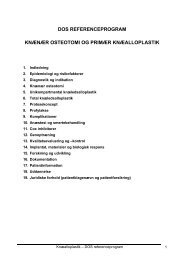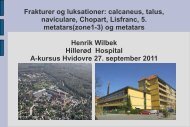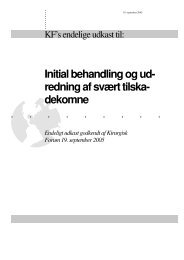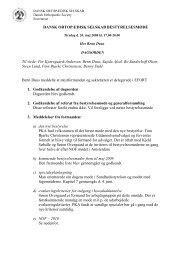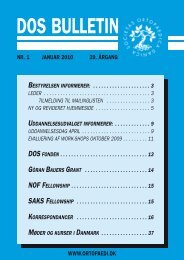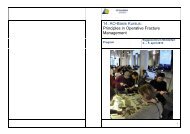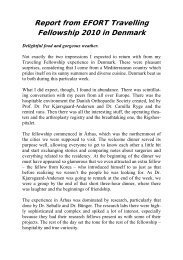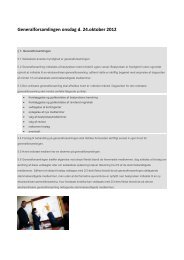DOS BULLETIN - Dansk Ortopædisk Selskab
DOS BULLETIN - Dansk Ortopædisk Selskab
DOS BULLETIN - Dansk Ortopædisk Selskab
Create successful ePaper yourself
Turn your PDF publications into a flip-book with our unique Google optimized e-Paper software.
2010-378_<strong>DOS</strong> nr. 3 2010 29/09/10 10:08 Side 73<br />
UNICAP® focal knee operations – Who are these for?<br />
J. O. Laursen<br />
Orthopedic Department, County Hospital Soenderborg<br />
Background: Introduction: In 2003, a new type of knee hemi-prosthesis was introduced<br />
in USA and Europe. HemiCAP was primary developed for articular cartilage lesions in<br />
knee, toe, shoulder and hips. In 2006, it was introduced to the Danish market (distributed<br />
by Ortotech). By then there was clinical follow up in USA and Europe at 3 years in<br />
around 5.000 patients, and the results were promising. 4 years later, the UNICAP was<br />
introduced for more advanced cartilage lesions om both femoral and tibial side. Over the<br />
years if you deal with surgery of the knee - arthroscopies or total knee replacements- you<br />
have seen many patients with minor cartilage lesions and perhaps have tried to inforate,<br />
transplant cartilage or utilize chondrocyte transplantation with more or less success. I<br />
introduced this implant in 2009, and have so far implanted 45 of these, just using the<br />
femoral part!<br />
Purpose: Follow-up kohorte study of a new implant concerning focal cartilage lesions<br />
in the knee- joint.<br />
Methods: Material and methods: There was a protocol for the operations: all patients<br />
had preoperative x-rays and MRI taken and all operations started with arthroscopy to<br />
confirm the cartilage damage was suitable for further UNICAP surgery and to deal with<br />
other damage to meniscus or cartilage. All operations were done with spinal or GA. PC<br />
preoperatively and using a tourniquet. Midincision –miniarthrotomy. Postoperative full<br />
weight-bearing and range of motion. Discharge 1-3 day postoperatively and controlled<br />
by x-rays postop. At 6, 12 weeks and 1 and 2 years including clinically controls with<br />
assessing of KSS. All patients were registered in the Danish Knee Society register. VAS<br />
– score was registered preoperatively and at follow-ups including KSS, complications<br />
and revisions.<br />
Findings: 11 women and 12 men is operated till now, with mean age men: 57 years (40-<br />
65); women 62 years (40 – 83). 15 performed in spinal anesthesia and 8 in GA. Operating<br />
time (knife time) were average 45 minutes (35 – 80 minutes) including arthroscopy<br />
and the UNICAP operation. 12 of the patients were still at work – but had been out of<br />
work for an average of 6 months. 7 women and four men were retired. All the workers<br />
were at work again in average of 6 months (2 – 12 months). The hospital stay was on<br />
average 3 days (2 – 4 days). There were seen no pre- or postoperative complications and<br />
no deep infections.One patient had the UNICAP revised to a TKA 6 month’s later. 15 ptt.<br />
had more than 3 months follow up and among these, 11 hand meniscus lesions – 11<br />
medial and 3 lateral lesion. KSS knee and functional scores were preoperatively at 56<br />
(30-60) and 38 (30- 70) respectively. And at controls ( >12 weeks ) at 91 ( 50-95 ) and<br />
81 ( 30-90 )( fig 1 ). VAS-score were preoperatively at 7 (6-8) and at control (> 12 weeks)<br />
at 2 (1-7). Painkillers were reduced from (1, 2, and 3) to (1, 2) or less. Untill now 45<br />
patients are operated, 27 have passed 3 month's control and 15 one year. 2 patients are<br />
revised to a TKA because of progressing arthrosis.<br />
Conclusion: So far I have found the UNICAP promishing for restoration of the medial<br />
chamber of the knee in patients with isolated focal cartilage lesions or onechamber<br />
arthrosis. Further study and follow-ups are nessesary to confirm this.<br />
73


